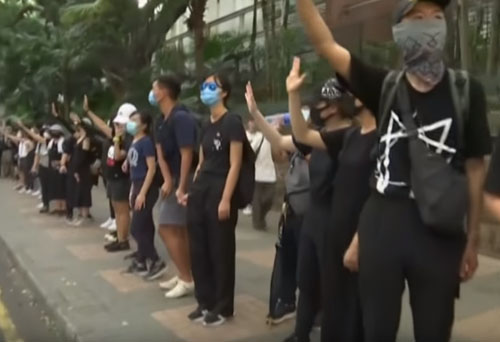by WorldTribune Staff, October 6, 2019
For the first time in 52 years, the Beijing-controlled leader of Hong Kong on Oct. 4 invoked a British colonial-era emergency law which includes a ban on the wearing of masks at protests.
The move by Hong Kong Chief Executive Carrie Lam sparked an immediate backlash from demonstrators who wear masks to avoid being identified by communist authorities and protect themselves from volleys of tear gas fired by police.

Mass street protests began on June 9 with a one-million person march and have filled Hong Kong streets and public sites continuously for four months with the threat of a Tiananmen Square-type bloodbath on everyone’s minds.
According to a South China Morning Post report, some protesters on the front lines are writing their wills, detailing their participation in the demonstrations and battles with police. One protester told the Post: “If you haven’t written one then you shouldn’t be on the front lines.”
During a boycott at a secondary school last month, a 15-year-old student surnamed Pang told the Post: “I can’t sleep and can’t eat, my heart is tired.”
Pang’s face, the report said, was covered by a full mask and he was dressed in black with protective shoulder, arm and shin pads. He carried a shield made from a road sign etched with the word “revolution.”
Related: Hong Kong leader caves; Independence activist issues global appeal, September 4, 2019
The ban on wearing masks at public gatherings and unlawful assemblies carries penalties which include up to one year in prison.
The full emergency law invoked by Lam “gives the government sweeping powers that include allowing authorities to impose curfews, censor media, and take control of ports and all transport, although the ban on masks was the only measure imposed on Oct. 4,” the Wall Street Journal reported.
Opponents said the use of emergency executive powers bypasses the legislature and could lead to greater restrictions on people’s freedoms in Hong Kong.
“What she’s done is alarming and dangerous — she’s pouring fuel on the fire,” said Emily Lau, a former chairwoman of the Democratic Party. “Once you open up Pandora’s box, where does it end?”
In announcing the emergency measures on Oct. 4, Lam said: “We need to save Hong Kong’s present and its future. Making this decision was not an easy decision. But with the current situation, it was a necessary one.”
Under the law invoked by Lam, those who wear masks at public gatherings with more than 50 people and marches with over 30 people face up to 12 months in jail and a fine of more than $3,000. Anyone who refuses to take off a mask at the request of police in a public area faces a fine of around $1,300 and up to six months in jail. The regulation applies to masks made of any material — including paint — that cover a person’s face.
The Hong Kong police force, and pro-Beijing groups, called for officials to invoke the ban on masks after the city was hit by its worst day of violence in more than 50 years during China’s National Day celebrations on Oct. 1.
“This may be the beginning of a draconian crackdown,” David Webb, an activist investor in Hong Kong, wrote on his website. The emergency regulations could be used again to legalize internment for long periods and block key parts of the Internet, including social media and communication apps, he said.
Lam’s announcement was followed by street battles which raged across Hong Kong on Oct. 4, the Journal reported.
“News of the mask ban spurred street demonstrations at lunchtime Friday, with crowds of protesters — most of them wearing masks — occupying a downtown road close to the government’s headquarters as Mrs. Lam spoke to media inside. After the announcement, thousands more poured onto streets across the city, many dressed in office or ordinary clothing, chanting ‘Hong Kong people, resist!’ Shops, gyms and malls began to close in anticipation of violence,” the report said.
A 14-year-old boy was shot in the leg by police in the northern district of Yuen Long, local media reported.
“This entire movement started off because of a law Hong Kong people didn’t agree with, and now Mrs. Lam is using an even harsher law to answer to those disagreements in society,” a civil servant surnamed Lam told the Journal.
Lam has given in to one of the five demands of the protesters as she pledged to formally withdraw the extradition bill which initially sparked the mass demonstrations.
The protesters, however, were not impressed. “Five key demands, not one less,” is now a new slogan in the protesters’ camp. Lam has refused to entertain the remaining four demands, which are for an independent investigation, amnesty for arrested protesters, a halt to categorizing the protests as riots, and genuine universal suffrage.
A 24-year-old protester identified as Kelvin told the Post: “I am actually frightened – very frightened – every time I leave home for the protests. I may have a fuller meal the night before and give my family members a heads-up that I may be gone for two days, just in case I’m arrested.”
Kelvin added: “It is very hard to judge whether it is worthwhile. I think I would still insist on doing it. I would rather be in jail for 10 years if this could really bring a change to Hong Kong.”
Vincent Lo, a recent university graduate, has only taken part in the peaceful protests but agrees with Kelvin.
“People have been saying we should save our energy for the next fight. But can you guarantee there will be a better chance than this in future?” he told the Post.
Intelligence Brief __________ Replace The Media
